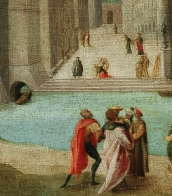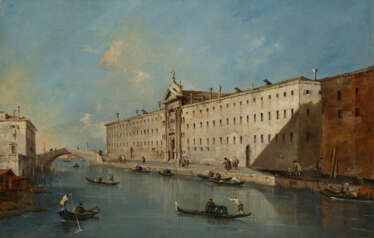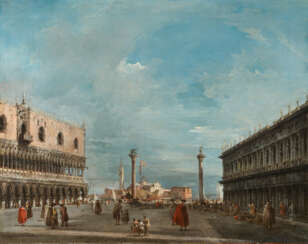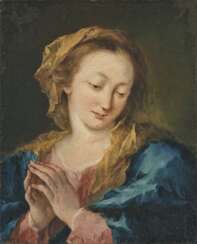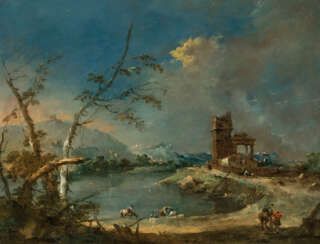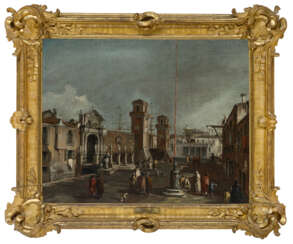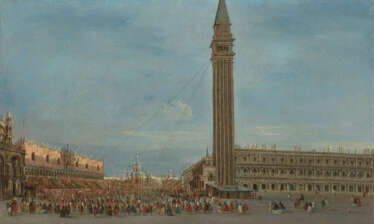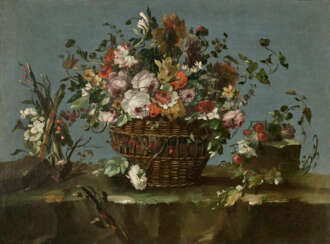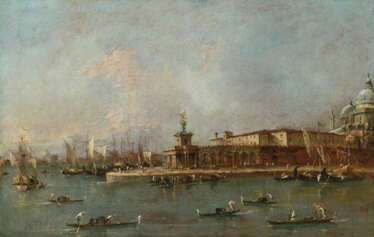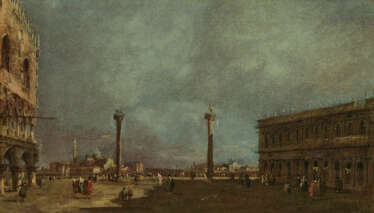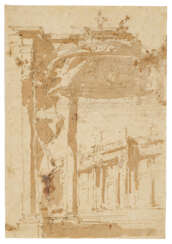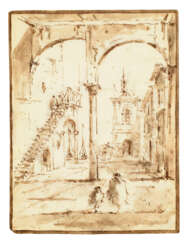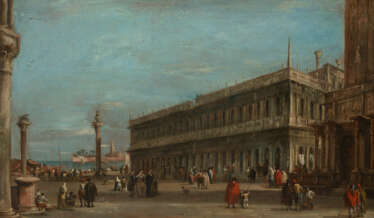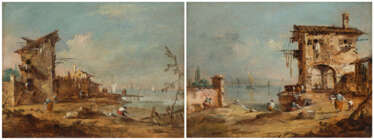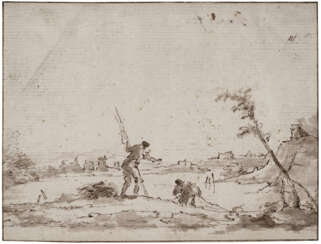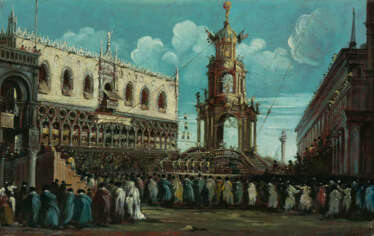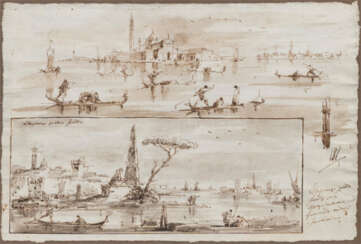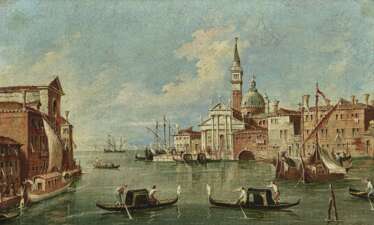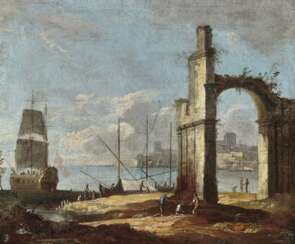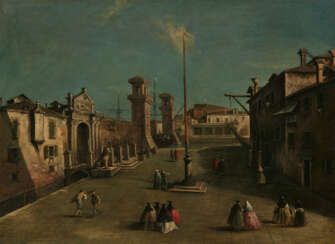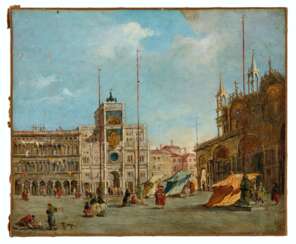франческо гварди (1712 - 1793)
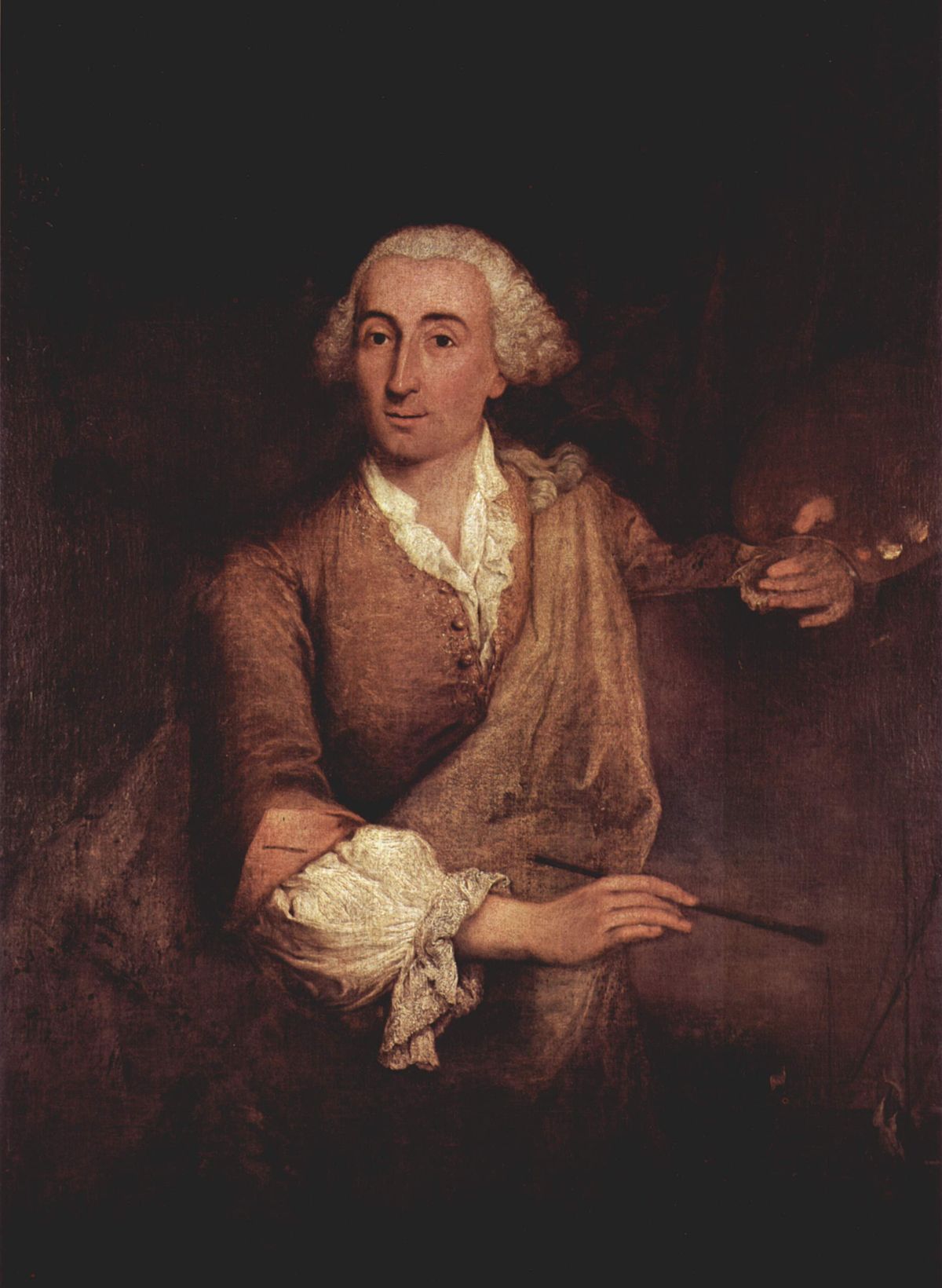
Francesco Lazzaro Guardi was an Italian painter, nobleman, and a member of the Venetian School. He is considered to be among the last practitioners, along with his brothers, of the classic Venetian school of painting.
In the early part of his career he collaborated with his older brother Gian Antonio in the production of religious paintings. After Gian Antonio's death in 1760, Francesco concentrated on vedute. The earliest of these show the influence of Canaletto, but he gradually adopted a looser style characterized by spirited brush-strokes and freely imagined architecture.
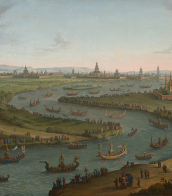

Francesco Lazzaro Guardi was an Italian painter, nobleman, and a member of the Venetian School. He is considered to be among the last practitioners, along with his brothers, of the classic Venetian school of painting.
In the early part of his career he collaborated with his older brother Gian Antonio in the production of religious paintings. After Gian Antonio's death in 1760, Francesco concentrated on vedute. The earliest of these show the influence of Canaletto, but he gradually adopted a looser style characterized by spirited brush-strokes and freely imagined architecture.
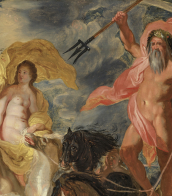

Francesco Lazzaro Guardi was an Italian painter, nobleman, and a member of the Venetian School. He is considered to be among the last practitioners, along with his brothers, of the classic Venetian school of painting.
In the early part of his career he collaborated with his older brother Gian Antonio in the production of religious paintings. After Gian Antonio's death in 1760, Francesco concentrated on vedute. The earliest of these show the influence of Canaletto, but he gradually adopted a looser style characterized by spirited brush-strokes and freely imagined architecture.
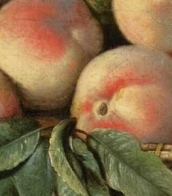

Francesco Lazzaro Guardi was an Italian painter, nobleman, and a member of the Venetian School. He is considered to be among the last practitioners, along with his brothers, of the classic Venetian school of painting.
In the early part of his career he collaborated with his older brother Gian Antonio in the production of religious paintings. After Gian Antonio's death in 1760, Francesco concentrated on vedute. The earliest of these show the influence of Canaletto, but he gradually adopted a looser style characterized by spirited brush-strokes and freely imagined architecture.
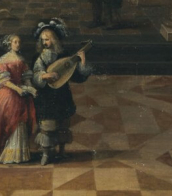

Francesco Lazzaro Guardi was an Italian painter, nobleman, and a member of the Venetian School. He is considered to be among the last practitioners, along with his brothers, of the classic Venetian school of painting.
In the early part of his career he collaborated with his older brother Gian Antonio in the production of religious paintings. After Gian Antonio's death in 1760, Francesco concentrated on vedute. The earliest of these show the influence of Canaletto, but he gradually adopted a looser style characterized by spirited brush-strokes and freely imagined architecture.
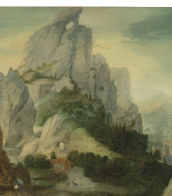

Francesco Lazzaro Guardi was an Italian painter, nobleman, and a member of the Venetian School. He is considered to be among the last practitioners, along with his brothers, of the classic Venetian school of painting.
In the early part of his career he collaborated with his older brother Gian Antonio in the production of religious paintings. After Gian Antonio's death in 1760, Francesco concentrated on vedute. The earliest of these show the influence of Canaletto, but he gradually adopted a looser style characterized by spirited brush-strokes and freely imagined architecture.
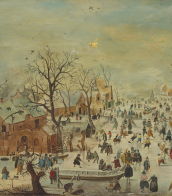

Francesco Lazzaro Guardi was an Italian painter, nobleman, and a member of the Venetian School. He is considered to be among the last practitioners, along with his brothers, of the classic Venetian school of painting.
In the early part of his career he collaborated with his older brother Gian Antonio in the production of religious paintings. After Gian Antonio's death in 1760, Francesco concentrated on vedute. The earliest of these show the influence of Canaletto, but he gradually adopted a looser style characterized by spirited brush-strokes and freely imagined architecture.
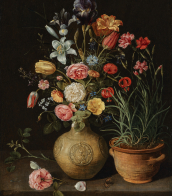

Francesco Lazzaro Guardi was an Italian painter, nobleman, and a member of the Venetian School. He is considered to be among the last practitioners, along with his brothers, of the classic Venetian school of painting.
In the early part of his career he collaborated with his older brother Gian Antonio in the production of religious paintings. After Gian Antonio's death in 1760, Francesco concentrated on vedute. The earliest of these show the influence of Canaletto, but he gradually adopted a looser style characterized by spirited brush-strokes and freely imagined architecture.
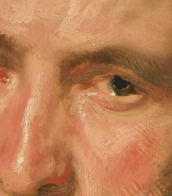

Francesco Lazzaro Guardi was an Italian painter, nobleman, and a member of the Venetian School. He is considered to be among the last practitioners, along with his brothers, of the classic Venetian school of painting.
In the early part of his career he collaborated with his older brother Gian Antonio in the production of religious paintings. After Gian Antonio's death in 1760, Francesco concentrated on vedute. The earliest of these show the influence of Canaletto, but he gradually adopted a looser style characterized by spirited brush-strokes and freely imagined architecture.
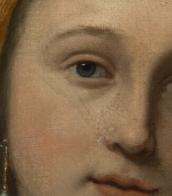

Francesco Lazzaro Guardi was an Italian painter, nobleman, and a member of the Venetian School. He is considered to be among the last practitioners, along with his brothers, of the classic Venetian school of painting.
In the early part of his career he collaborated with his older brother Gian Antonio in the production of religious paintings. After Gian Antonio's death in 1760, Francesco concentrated on vedute. The earliest of these show the influence of Canaletto, but he gradually adopted a looser style characterized by spirited brush-strokes and freely imagined architecture.
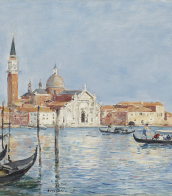

Francesco Lazzaro Guardi was an Italian painter, nobleman, and a member of the Venetian School. He is considered to be among the last practitioners, along with his brothers, of the classic Venetian school of painting.
In the early part of his career he collaborated with his older brother Gian Antonio in the production of religious paintings. After Gian Antonio's death in 1760, Francesco concentrated on vedute. The earliest of these show the influence of Canaletto, but he gradually adopted a looser style characterized by spirited brush-strokes and freely imagined architecture.


Francesco Lazzaro Guardi was an Italian painter, nobleman, and a member of the Venetian School. He is considered to be among the last practitioners, along with his brothers, of the classic Venetian school of painting.
In the early part of his career he collaborated with his older brother Gian Antonio in the production of religious paintings. After Gian Antonio's death in 1760, Francesco concentrated on vedute. The earliest of these show the influence of Canaletto, but he gradually adopted a looser style characterized by spirited brush-strokes and freely imagined architecture.
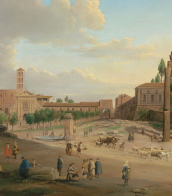

Francesco Lazzaro Guardi was an Italian painter, nobleman, and a member of the Venetian School. He is considered to be among the last practitioners, along with his brothers, of the classic Venetian school of painting.
In the early part of his career he collaborated with his older brother Gian Antonio in the production of religious paintings. After Gian Antonio's death in 1760, Francesco concentrated on vedute. The earliest of these show the influence of Canaletto, but he gradually adopted a looser style characterized by spirited brush-strokes and freely imagined architecture.
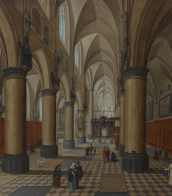

Francesco Lazzaro Guardi was an Italian painter, nobleman, and a member of the Venetian School. He is considered to be among the last practitioners, along with his brothers, of the classic Venetian school of painting.
In the early part of his career he collaborated with his older brother Gian Antonio in the production of religious paintings. After Gian Antonio's death in 1760, Francesco concentrated on vedute. The earliest of these show the influence of Canaletto, but he gradually adopted a looser style characterized by spirited brush-strokes and freely imagined architecture.
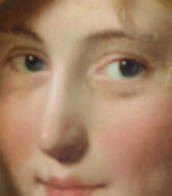

Francesco Lazzaro Guardi was an Italian painter, nobleman, and a member of the Venetian School. He is considered to be among the last practitioners, along with his brothers, of the classic Venetian school of painting.
In the early part of his career he collaborated with his older brother Gian Antonio in the production of religious paintings. After Gian Antonio's death in 1760, Francesco concentrated on vedute. The earliest of these show the influence of Canaletto, but he gradually adopted a looser style characterized by spirited brush-strokes and freely imagined architecture.


Francesco Lazzaro Guardi was an Italian painter, nobleman, and a member of the Venetian School. He is considered to be among the last practitioners, along with his brothers, of the classic Venetian school of painting.
In the early part of his career he collaborated with his older brother Gian Antonio in the production of religious paintings. After Gian Antonio's death in 1760, Francesco concentrated on vedute. The earliest of these show the influence of Canaletto, but he gradually adopted a looser style characterized by spirited brush-strokes and freely imagined architecture.
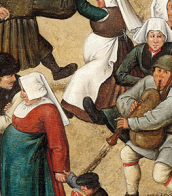

Francesco Lazzaro Guardi was an Italian painter, nobleman, and a member of the Venetian School. He is considered to be among the last practitioners, along with his brothers, of the classic Venetian school of painting.
In the early part of his career he collaborated with his older brother Gian Antonio in the production of religious paintings. After Gian Antonio's death in 1760, Francesco concentrated on vedute. The earliest of these show the influence of Canaletto, but he gradually adopted a looser style characterized by spirited brush-strokes and freely imagined architecture.
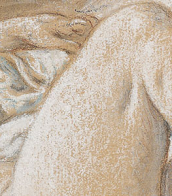

Francesco Lazzaro Guardi was an Italian painter, nobleman, and a member of the Venetian School. He is considered to be among the last practitioners, along with his brothers, of the classic Venetian school of painting.
In the early part of his career he collaborated with his older brother Gian Antonio in the production of religious paintings. After Gian Antonio's death in 1760, Francesco concentrated on vedute. The earliest of these show the influence of Canaletto, but he gradually adopted a looser style characterized by spirited brush-strokes and freely imagined architecture.


Francesco Lazzaro Guardi was an Italian painter, nobleman, and a member of the Venetian School. He is considered to be among the last practitioners, along with his brothers, of the classic Venetian school of painting.
In the early part of his career he collaborated with his older brother Gian Antonio in the production of religious paintings. After Gian Antonio's death in 1760, Francesco concentrated on vedute. The earliest of these show the influence of Canaletto, but he gradually adopted a looser style characterized by spirited brush-strokes and freely imagined architecture.
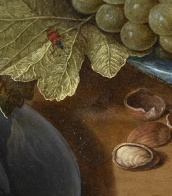

Francesco Lazzaro Guardi was an Italian painter, nobleman, and a member of the Venetian School. He is considered to be among the last practitioners, along with his brothers, of the classic Venetian school of painting.
In the early part of his career he collaborated with his older brother Gian Antonio in the production of religious paintings. After Gian Antonio's death in 1760, Francesco concentrated on vedute. The earliest of these show the influence of Canaletto, but he gradually adopted a looser style characterized by spirited brush-strokes and freely imagined architecture.


Francesco Lazzaro Guardi was an Italian painter, nobleman, and a member of the Venetian School. He is considered to be among the last practitioners, along with his brothers, of the classic Venetian school of painting.
In the early part of his career he collaborated with his older brother Gian Antonio in the production of religious paintings. After Gian Antonio's death in 1760, Francesco concentrated on vedute. The earliest of these show the influence of Canaletto, but he gradually adopted a looser style characterized by spirited brush-strokes and freely imagined architecture.
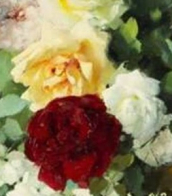

Francesco Lazzaro Guardi was an Italian painter, nobleman, and a member of the Venetian School. He is considered to be among the last practitioners, along with his brothers, of the classic Venetian school of painting.
In the early part of his career he collaborated with his older brother Gian Antonio in the production of religious paintings. After Gian Antonio's death in 1760, Francesco concentrated on vedute. The earliest of these show the influence of Canaletto, but he gradually adopted a looser style characterized by spirited brush-strokes and freely imagined architecture.
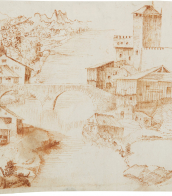

Francesco Lazzaro Guardi was an Italian painter, nobleman, and a member of the Venetian School. He is considered to be among the last practitioners, along with his brothers, of the classic Venetian school of painting.
In the early part of his career he collaborated with his older brother Gian Antonio in the production of religious paintings. After Gian Antonio's death in 1760, Francesco concentrated on vedute. The earliest of these show the influence of Canaletto, but he gradually adopted a looser style characterized by spirited brush-strokes and freely imagined architecture.
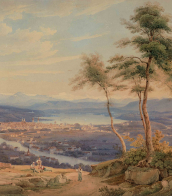

Francesco Lazzaro Guardi was an Italian painter, nobleman, and a member of the Venetian School. He is considered to be among the last practitioners, along with his brothers, of the classic Venetian school of painting.
In the early part of his career he collaborated with his older brother Gian Antonio in the production of religious paintings. After Gian Antonio's death in 1760, Francesco concentrated on vedute. The earliest of these show the influence of Canaletto, but he gradually adopted a looser style characterized by spirited brush-strokes and freely imagined architecture.
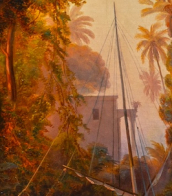

Francesco Lazzaro Guardi was an Italian painter, nobleman, and a member of the Venetian School. He is considered to be among the last practitioners, along with his brothers, of the classic Venetian school of painting.
In the early part of his career he collaborated with his older brother Gian Antonio in the production of religious paintings. After Gian Antonio's death in 1760, Francesco concentrated on vedute. The earliest of these show the influence of Canaletto, but he gradually adopted a looser style characterized by spirited brush-strokes and freely imagined architecture.
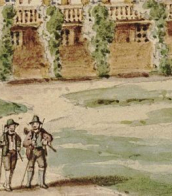

Francesco Lazzaro Guardi was an Italian painter, nobleman, and a member of the Venetian School. He is considered to be among the last practitioners, along with his brothers, of the classic Venetian school of painting.
In the early part of his career he collaborated with his older brother Gian Antonio in the production of religious paintings. After Gian Antonio's death in 1760, Francesco concentrated on vedute. The earliest of these show the influence of Canaletto, but he gradually adopted a looser style characterized by spirited brush-strokes and freely imagined architecture.


Francesco Lazzaro Guardi was an Italian painter, nobleman, and a member of the Venetian School. He is considered to be among the last practitioners, along with his brothers, of the classic Venetian school of painting.
In the early part of his career he collaborated with his older brother Gian Antonio in the production of religious paintings. After Gian Antonio's death in 1760, Francesco concentrated on vedute. The earliest of these show the influence of Canaletto, but he gradually adopted a looser style characterized by spirited brush-strokes and freely imagined architecture.


Francesco Lazzaro Guardi was an Italian painter, nobleman, and a member of the Venetian School. He is considered to be among the last practitioners, along with his brothers, of the classic Venetian school of painting.
In the early part of his career he collaborated with his older brother Gian Antonio in the production of religious paintings. After Gian Antonio's death in 1760, Francesco concentrated on vedute. The earliest of these show the influence of Canaletto, but he gradually adopted a looser style characterized by spirited brush-strokes and freely imagined architecture.


Francesco Lazzaro Guardi was an Italian painter, nobleman, and a member of the Venetian School. He is considered to be among the last practitioners, along with his brothers, of the classic Venetian school of painting.
In the early part of his career he collaborated with his older brother Gian Antonio in the production of religious paintings. After Gian Antonio's death in 1760, Francesco concentrated on vedute. The earliest of these show the influence of Canaletto, but he gradually adopted a looser style characterized by spirited brush-strokes and freely imagined architecture.


Francesco Lazzaro Guardi was an Italian painter, nobleman, and a member of the Venetian School. He is considered to be among the last practitioners, along with his brothers, of the classic Venetian school of painting.
In the early part of his career he collaborated with his older brother Gian Antonio in the production of religious paintings. After Gian Antonio's death in 1760, Francesco concentrated on vedute. The earliest of these show the influence of Canaletto, but he gradually adopted a looser style characterized by spirited brush-strokes and freely imagined architecture.
